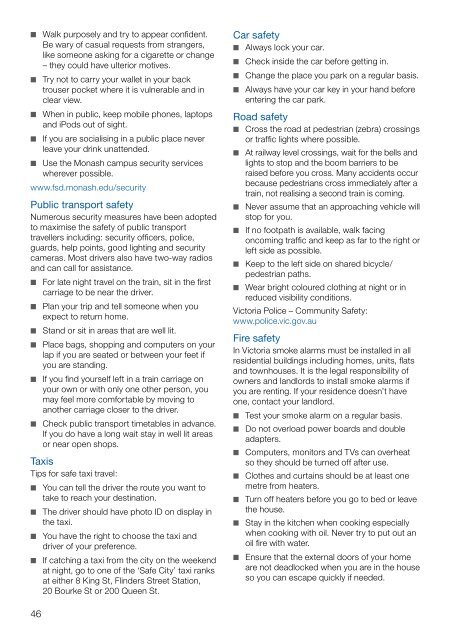Destination
Create successful ePaper yourself
Turn your PDF publications into a flip-book with our unique Google optimized e-Paper software.
n Walk purposely and try to appear confident.<br />
Be wary of casual requests from strangers,<br />
like someone asking for a cigarette or change<br />
– they could have ulterior motives.<br />
n Try not to carry your wallet in your back<br />
trouser pocket where it is vulnerable and in<br />
clear view.<br />
n When in public, keep mobile phones, laptops<br />
and iPods out of sight.<br />
n If you are socialising in a public place never<br />
leave your drink unattended.<br />
n Use the Monash campus security services<br />
wherever possible.<br />
www.fsd.monash.edu/security<br />
Public transport safety<br />
Numerous security measures have been adopted<br />
to maximise the safety of public transport<br />
travellers including: security officers, police,<br />
guards, help points, good lighting and security<br />
cameras. Most drivers also have two-way radios<br />
and can call for assistance.<br />
n For late night travel on the train, sit in the first<br />
carriage to be near the driver.<br />
n Plan your trip and tell someone when you<br />
expect to return home.<br />
n Stand or sit in areas that are well lit.<br />
n Place bags, shopping and computers on your<br />
lap if you are seated or between your feet if<br />
you are standing.<br />
n If you find yourself left in a train carriage on<br />
your own or with only one other person, you<br />
may feel more comfortable by moving to<br />
another carriage closer to the driver.<br />
n Check public transport timetables in advance.<br />
If you do have a long wait stay in well lit areas<br />
or near open shops.<br />
Taxis<br />
Tips for safe taxi travel:<br />
n You can tell the driver the route you want to<br />
take to reach your destination.<br />
n The driver should have photo ID on display in<br />
the taxi.<br />
n You have the right to choose the taxi and<br />
driver of your preference.<br />
n If catching a taxi from the city on the weekend<br />
at night, go to one of the ‘Safe City’ taxi ranks<br />
at either 8 King St, Flinders Street Station,<br />
20 Bourke St or 200 Queen St.<br />
46<br />
Car safety<br />
n Always lock your car.<br />
n Check inside the car before getting in.<br />
n Change the place you park on a regular basis.<br />
n Always have your car key in your hand before<br />
entering the car park.<br />
Road safety<br />
n Cross the road at pedestrian (zebra) crossings<br />
or traffic lights where possible.<br />
n At railway level crossings, wait for the bells and<br />
lights to stop and the boom barriers to be<br />
raised before you cross. Many accidents occur<br />
because pedestrians cross immediately after a<br />
train, not realising a second train is coming.<br />
n Never assume that an approaching vehicle will<br />
stop for you.<br />
n If no footpath is available, walk facing<br />
oncoming traffic and keep as far to the right or<br />
left side as possible.<br />
n Keep to the left side on shared bicycle/<br />
pedestrian paths.<br />
n Wear bright coloured clothing at night or in<br />
reduced visibility conditions.<br />
Victoria Police – Community Safety:<br />
www.police.vic.gov.au<br />
Fire safety<br />
In Victoria smoke alarms must be installed in all<br />
residential buildings including homes, units, flats<br />
and townhouses. It is the legal responsibility of<br />
owners and landlords to install smoke alarms if<br />
you are renting. If your residence doesn’t have<br />
one, contact your landlord.<br />
n Test your smoke alarm on a regular basis.<br />
n Do not overload power boards and double<br />
adapters.<br />
n Computers, monitors and TVs can overheat<br />
so they should be turned off after use.<br />
n Clothes and curtains should be at least one<br />
metre from heaters.<br />
n Turn off heaters before you go to bed or leave<br />
the house.<br />
n Stay in the kitchen when cooking especially<br />
when cooking with oil. Never try to put out an<br />
oil fire with water.<br />
n Ensure that the external doors of your home<br />
are not deadlocked when you are in the house<br />
so you can escape quickly if needed.


